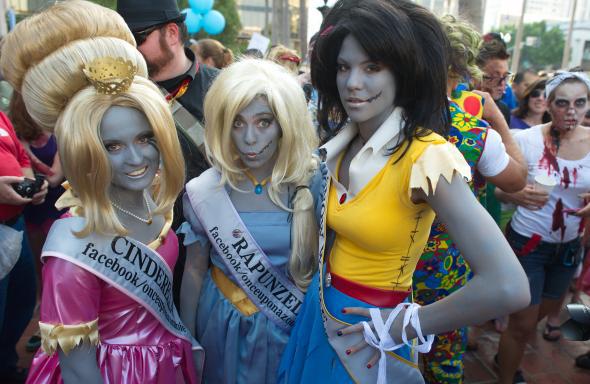The recent accounting of everyday sexism has a new entry: As the Mary Sue’s Jill Pantozzi wrote on Friday, Geeks for CONsent, a group committed to rooting out sexual harassment at comic conventions, has been fighting to get Comic-Con International in San Diego (SDCC) to update its harassment policy. Demeaning and threatening behavior is a well-documented problem where fans in the weeds of their fantasy heroes mingle en masse. Last year, a blogger at Comic-Con International posted pictures of attending women’s butts without their knowledge. As the 2014 conference approaches, Geeks for CONsent created a petition asking SDCC for a “full harassment policy,” as well as anti-harassment signs and trained volunteers to deal with complaints.
So far, the petition has inked more than 2,000 signatures. But in an interview with Comic Book Resources, Comic-Con public relations director David Glanzer shot down the demands. He said SDCC already has a harassment policy (and its painful vagueness—“Harassing or offensive behavior will not be tolerated”—is intentional), that the policy is readily accessible on the organization’s website (though the Mary Sue sleuths had to go on a 10-link-long vision quest to find it), and that signs would give press and outsiders the wrong idea:
I will tell you, though, that because we’re really an international show, and have 3,000 members of the media, I think the story would be harassment is such an issue at Comic-Con that they needed to post these signs around there. Now, people within the industry, and fans, know that isn’t the case, but the general public out there, and I think the news media, might look at this as, “Why would you, if this wasn’t such a bad issue, why do you feel the need to single out this one issue and put signs up about it?” I think that’s a concern.
So SDCC would rather ignore the real, frequent instances of female cosplayers feeling targeted or unsafe than send a message that harassment is a problem. That’s infuriating, but also unwise—the many women who attend the event would likely respond positively to seeing their experience validated and their safety concerns taken seriously. Were Glanzer less blind to the existence of girl geeks, he’d know that anti-harassment signs would do the opposite of begriming SDCC’s image. In March, the Emerald City Comicon in Seattle drew tons of happy publicity with a poster campaign called “Costumes Are Not Consent.” But asked about Seattle, Glanzer told CBR: “What works at other conventions might not necessarily apply to ours. I don’t know. I think we’re comfortable in the policy we have.” My PR translator renders this: Yes, but. Status quo. So comfy, like a flannel shirt.
Woman cosplayers face an uphill climb in part because most women in the interrelated nerdospheres of gaming, fantasy, and tech face an uphill climb. This weekend, the New York Times reported on the gender imbalance in programming: Only 0.4 percent of women entering college intend to major in computer science, and women comprise just 14 percent of computer science graduates. Meanwhile, a slender 17 percent of Google’s tech employees are female. In pop culture, too, the computer lab and the gaming den are a man’s man’s world—just ask the lamely sexist nerdbros of HBO’s Silicon Valley.
In a searing indictment of entitlement and nerd-lust for the Daily Beast, Arthur Chu proposes that sexism may be baked into the geek DNA. He lays out one go-to geek trope—the socially awkward guy who “earns” the hot babe through persistence, smarts, and niceness. Mostly persistence. “It’s a narrative that nerds and nerd media kept repeating,” he says. “That if we try hard enough … we’ll get the girl in the end. Like life is a video game and women, like money and status, are just part of the reward.”
Offline, of course, continuing to pursue a woman who’s not interested in you goes by a different name: harassment. And the gamer mentality that turns women into prizes, not protagonists, feels awfully related to SDCC’s cavalier attitude toward female cosplayers. It could be that Glanzer honestly doesn’t believe sexual harassment happens at comic conventions. (My colleague Amanda Hess has written about why even well-intentioned men overlook misogyny.) But it could also be that he doesn’t want to publicize the issue because, especially in the absence of female perspectives, he’s not so sure it’s a big deal. “Why do you feel the need to single out this one issue and put up signs about it?” he imagined the press wondering in his CBR interview. But this is projection. He is the one who doesn’t understand that harassment of women in his world is an issue, and that Comic-Con could suffer for that massive blind spot.
